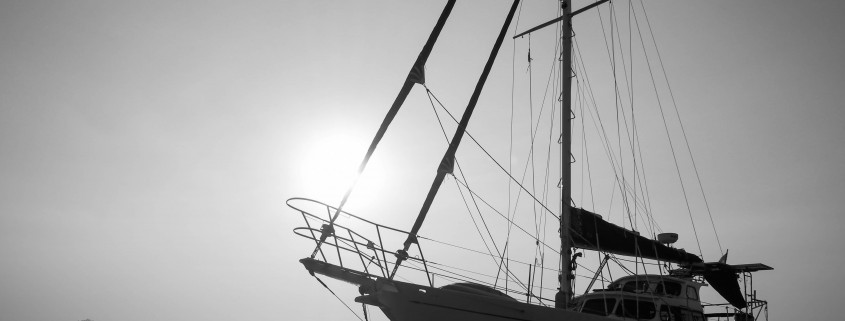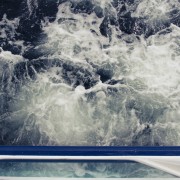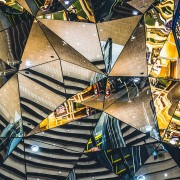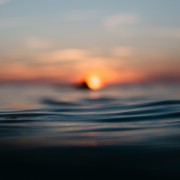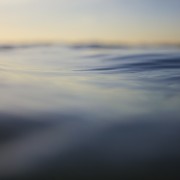Listening Inside
Sailing single-handed you don’t sleep much, not for very long at a stretch. Like you don’t sleep caring for a restless newborn, except on a boat, the first time you go alone the newborn is yourself.
Everything about the ocean looks brand new, as though you’ve never seen it before. Out of sight of land, the possibility of sinking the boat, the fear of falling overboard with no one to pick you up, nobody to share the risk, you’re alone with your perceptions of the danger and the beauty, and it’s a constant thrill. Like the first time as a father you find yourself alone with your first-born baby, and you know what to do, but you’re afraid of not knowing enough.
On a boat alone, babysitting yourself in deepwater, whatever you do is deliberately done. And you can’t sleep. The first day out, I tried to nap several of times before the sun went down. Nothing doing. Closing my eyes, I felt like I was vibrating inside, hyper alert. The adrenaline had me pumped. The offshore sound of the wave action against the hull was unfamiliar and chaotic, like the ocean could break through at any moment. Knowing that was unlikely was no comfort in a boat that was leaking. The automatic bilge pump kicked on about every forty-five minutes. The constant motion of the hull worked every muscle. Nowhere to get away from it. Lying flat, trying to rest, I got dizzy when I closed my eyes.
Sea conditions were moderate, five to eight feet. The wind out of the northeast died off during the middle of the day. Sailing south, the boat wallowed and rolled downwind slower than I could have walked to Key West. At this rate, the passage would take six days instead of four. And wallowing downwind, I was slightly seasick.
After the sun went down, the wind picked up and got cold. Around 0300, I did lose consciousness. Not for long, for as long as you sleep, you’re helpless in the arms of an unpredictable mother. She rocks you and lulls you, but you can’t trust her, and all of your senses are alive to the slightest deviation in the boat’s security. It’s a paranormal relationship you have with mother ocean and the boat. When you’re sleeping, when something is wrong, you wake up knowing it. Nothing seems different than when you closed your eyes. Your heart slams against your rib cage, and you listen to the rhythm of the boat. The slap and slosh of the ocean drubbing the hull is just as it was when you closed your eyes. The wind and wave action are unchanged. The automatic bilge pump is silent. Maybe the leak had slowed down. The bulkhead compass said the boat was on course.
I looked at the radar and saw the blip of a target, a ship about fifteen miles out. I wiggled into foul weather gear and went on deck. Just off the starboard bow, I could see the running lights of the freighter, two tall towers, one at the bow and one at the stern, a pair of single white lights, the stern taller than the bow. I checked his course relative to mine, to see if we were on a collision course, and I couldn’t tell.
Trying to gage relative positions at night, you’re susceptible to optical illusions brought on by fear. I chose a fixed point on my boat, and watched the approaching vessel. It did not change position relative to my fixed point. I looked away and looked back several times. The freighter appeared to sit still.
With the autopilot steering the boat, I got behind the wheel, listening inside myself for which way to turn. The angle the freighter had on me made it hard to know, coming not quite head on, so that turning and going straight at her would not guarantee a safe crossing. I did not want to turn and change my mind; that was how you got run over.
A calm voice in my head kept telling me to maintain course and speed. There were two voices: one irrationally telling me to maintain, the other logically screaming, turn the boat, but which way the screamer couldn’t say.
“Our Father who art in heaven,” I recited the words, “our father who art in heaven . . .”
The calm voice reiterated, “Maintain course and speed.”
I did not fully trust it, but I was too scared to make a contrary decision.
The freighter came on until her running lights made shadowy silhouettes of container boxes stacked high. And then the freighter itself turned, adjusting course for Mobile Bay, headed up the sea lane I was running parallel to in the opposite direction.
For not turning one way or the other, I have no explanation but a voice that was activated when I repeated the words of a prayer I had memorized as a child.
I was not run over, actually saved for the balance of a night babysitting myself in deepwater.

